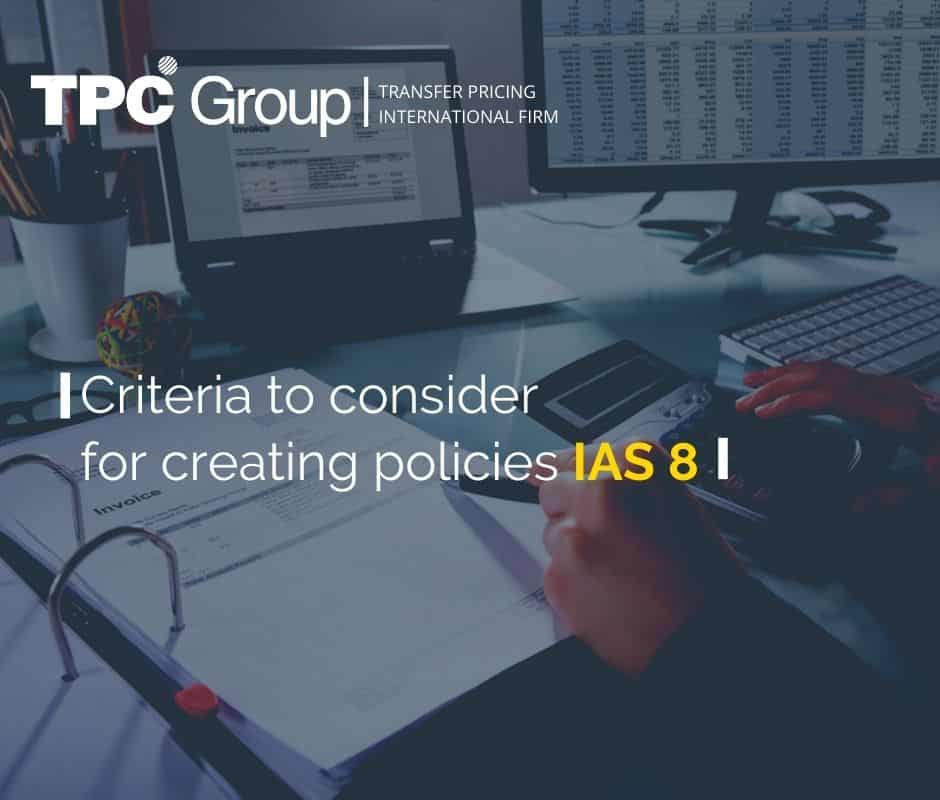Why create an accounting policy?
In order for the organization to operate more efficiently, the entity must have documented organizational systems that allow them to evidence that their transactions are properly recorded in compliance with the rules, procedures and technical instructions. In this way, the financial statements present relevant and reliable information on which to base their financial decisions.
Accounting policies are important, among others:
- They set the basis for the preparation of its financial statements.
- Standards are created for the recognition and measurement of transactions at the time the accounting records are made.
- They guide users of the information.
- Guidelines are established in accordance with the regulations in a consistent and uniform manner.
What are accounting policies?
International Accounting Standard No. 8 (IAS 8) defines accounting policies as the specific principles, bases, conventions, rules and procedures adopted by an entity in preparing and presenting financial statements.
Characteristics of accounting policies
The accounting policies should be, in accordance with the standard:
- Clear and uniform.
- Prepared in accordance with the provisions of the IFRS.
- Consistent over time, so that they are comparable.
- Accessible.
IAS 8 requirements to create an accounting policy
The requirements of the Standard can be summarized as follows:
1. Selection and application of accounting policies
- Where an IFRS is specifically applicable to a transaction, other event or condition, the accounting policy or policies applied to that item shall be determined by applying the particular IFRS. These policies need not be applied when the effect of their use is not significant.
- In the absence of an IFRS that is specifically applicable to a transaction or other event or condition, management should use its judgment in developing and applying an accounting policy to provide information that is relevant and reliable.
2. Professional judgment
When the entity needs to use its professional judgment for the development of a policy, it must refer to the following sources, as established by regulation:
- The requirements and guidelines established in IFRSs that deal with similar and related issues.
- The definitions, recognition and measurement criteria established for assets, liabilities, income and expenses in the Conceptual Framework.
- The most recent pronouncements of other standard-setting institutions that use a similar conceptual framework when issuing accounting standards, as well as other accounting literature and accepted practices in different industries, to the extent that they do not conflict with IFRS.
3. Uniformity
The Standard establishes that uniformity should be taken into account when selecting and applying its accounting policies. So that transactions, other events and conditions that are similar are presented consistently across periods, unless an IFRS specifically requires or permits categories of items for which it may be appropriate to apply different policies. If an IFRS requires or permits such categories to be established, an appropriate accounting policy shall be selected and applied consistently to each category.
4. Changes in accounting policies
The entity will change an accounting policy only if such a change:
- is required by an application of an IFRS.
- On a voluntary basis, because such a procedure leads to the financial statements providing more reliable and relevant information about the effects of transactions, other events or conditions affecting the financial position, financial performance or cash flows of the entity.
The following situations do not constitute changes in accounting policies:
- The application of an accounting policy for transactions, other events or conditions that differ substantially from those that have previously occurred.
- The application of a new accounting policy for transactions, other events or conditions that have not occurred previously or that, if they did occur, were immaterial.
5. How changes in accounting policies are applied
|
Change in accounting policy |
Accounting format |
|
When a change in accounting policy results from the initial application of a IFRS |
An entity shall account in accordance with the specific transitional provisions of those IFRSs |
| When the change in accounting policy results from the initial application of an IFRS that does not include a specific transitional provision applicable to such change, or because you have decided to change it voluntarily |
The entity will apply such change retroactively. |
6. Retroactive application
When a change in accounting policy is applied retroactively, the entity will make the corresponding adjustment to the opening balances of each component of equity that is affected, as if the new accounting policy had always been applied.
If it is impracticable to determine the effects in each specific period of a change in accounting policy on comparative information for one or more prior periods for which information is presented, the cumulative effect should be applied to the carrying balances at the beginning of the first period for which retrospective application is practicable.
7. Disclosure of a change in accounting policy
When there is a change in accounting policy, the entity shall disclose:
- The nature of the change in accounting policy.
- The amount of the adjustment to each financial statement item affected, for the current period and for each prior period presented, to the extent practicable.
- The amount of the adjustment relating to prior periods presented, to the extent practicable.
- If the retroactive application required by the 1st and 2nd items is not practicable, the circumstances leading to the existence of that situation.
- A description of how and since when the change in accounting policy has been applied.
Islava Zulema Ruiz Quiroz Degree in Public Accounting




